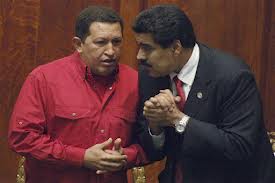 He began his career as a bus driver in Caracas, then rose through the ranks to become a member of Venezuelan President Hugo Chavez’s inner circle.
He began his career as a bus driver in Caracas, then rose through the ranks to become a member of Venezuelan President Hugo Chavez’s inner circle.
Now, if Chavez’s health worsens, Vice President Nicolas Maduro could be the one to take the reins.
Chavez, who is battling cancer, said Saturday that Maduro should replace him “if something were to happen that would incapacitate me.”
“My firm opinion, as clear as the full moon — irrevocable, absolute, total — is … that you elect Nicolas Maduro as president,” Chavez said, waving a copy of the Venezuelan Constitution as he spoke. “I ask this of you from my heart. He is one of the young leaders with the greatest ability to continue, if I cannot.”
The televised address marked the first time the Venezuelan president specified whom he wants to be his successor.
Maduro, 50, has long been a high-profile face in Chavez’s administration. He is often seen in the front row of Chavez’s press conferences and has traveled to Cuba as the Venezuelan leader undergoes cancer treatment.
“He is without a doubt one of the ministers who is closest to Chavez,” political analyst German Campos told CNN en Español after Chavez tapped Maduro as vice president in October.
Maduro is also Venezuela’s foreign minister, a position he’s held since 2006.
In that role, Maduro has been the South American country’s top diplomat as tensions rose with the United States and ties grew with Cuba.
“The U.S. Department of the Treasury is trying to become a sort of world police agency to describe decent citizens of our country … as drug traffickers,” Maduro said in 2011, after the department added four Venezuelan officials to its drug kingpin list.
“A country like that has no moral authority to judge generals and political officials in Venezuela,” Maduro said. “We reject it and we believe that the drug trafficking mafias are there, in a sick society like the United States.”
After security screeners detained him at New York’s John F. Kennedy Airport in 2006, Maduro called the U.S. government “racist” and “Nazi” and said the United States does not appreciate Latin American countries.
Before his role representing Venezuela abroad, Maduro honed his political skills at home.
He became a union leader while working for the Caracas metro system.
After Chavez came to power in 1999, Maduro participated in an assembly that drafted a new constitution.
He served as a congressman until 2006, when he was tapped as foreign minister.
If the president dies, Venezuela’s constitution specifies that the vice president assumes the presidency until new elections can be held.
But analysts have said it’s difficult to determine who would succeed Chavez, whose personal charisma and popularity have led to throngs of followers who call themselves “Chavistas.”
“You have to ask what’s held things together in Venezuela. … Part of what’s held it together is that Chavez, despite his government’s problems, is somebody who has a tremendous emotional connection and charisma with a lot of Venezuelans,” said Michael Shifter, president of the Washington-based Inter-American Dialogue think tank.
“All of the people who are potential successors of Chavez are people who are polarizing and confrontational,” Shifter told CNN earlier this year. “They’re loyal to Chavez, but they don’t have Chavez’s ability to connect with most Venezuelans.”
Polls have indicated that although Chavez still has strong backing from his supporters, other possible successors don’t seem to generate that kind of enthusiasm. A February poll by the Datanalisis firm showed Maduro with 9.8% support among militant members of Chavez’s United Socialist Party of Venezuela.
When he named Maduro as vice president in October, Chavez noted his extensive experience on “different battlefronts.”
“The bourgeoisie make fun of Nicolas Maduro because he was a bus driver,” Chavez said, “and look where he’s going now.”
CNN

Leave a Reply
You must be logged in to post a comment.